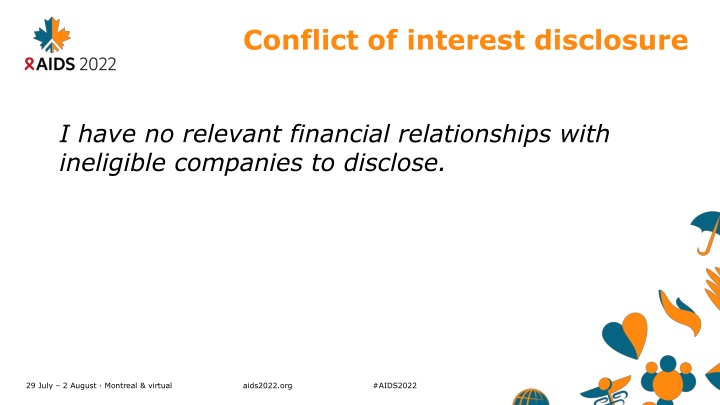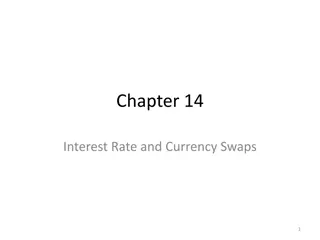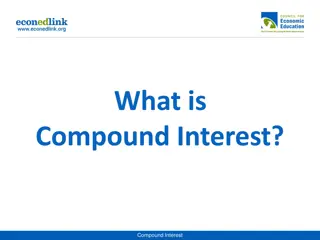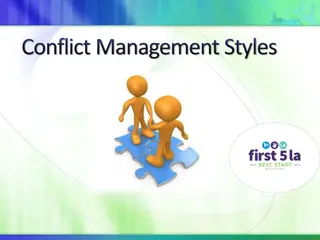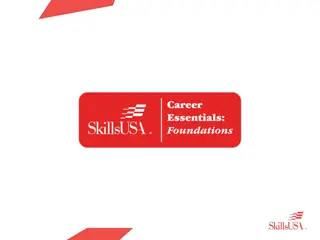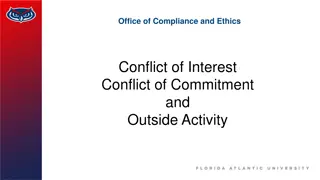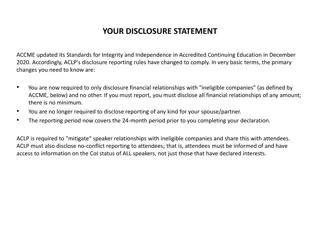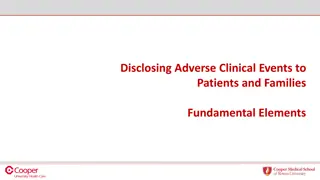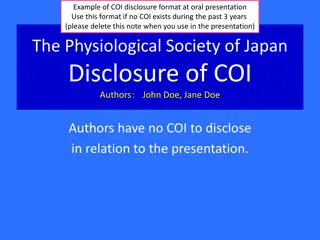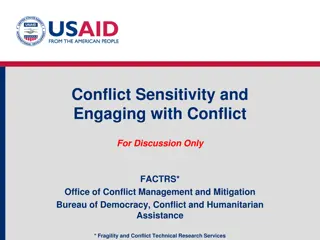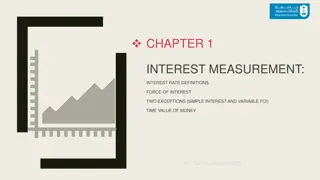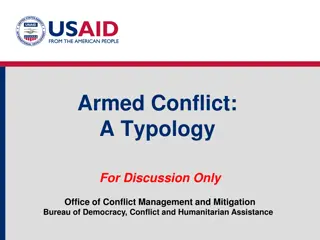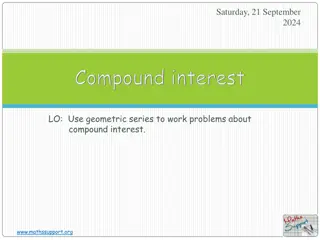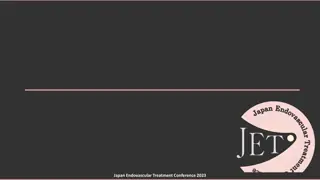Conflict of interest disclosure
Local production of HIV commodities can lead to increased access to quality testing and medications, efficient spending, economic growth, enhanced technological competence, and reduced dependence on external sources. This strategy explored in Nigeria aims to promote domestic ownership and financial sustainability in combating HIV.
Download Presentation

Please find below an Image/Link to download the presentation.
The content on the website is provided AS IS for your information and personal use only. It may not be sold, licensed, or shared on other websites without obtaining consent from the author.If you encounter any issues during the download, it is possible that the publisher has removed the file from their server.
You are allowed to download the files provided on this website for personal or commercial use, subject to the condition that they are used lawfully. All files are the property of their respective owners.
The content on the website is provided AS IS for your information and personal use only. It may not be sold, licensed, or shared on other websites without obtaining consent from the author.
E N D
Presentation Transcript
Conflict of interest disclosure I have no relevant financial relationships with ineligible companies to disclose. 29 July 2 August Montreal & virtual aids2022.org #AIDS2022
aids2022.org #AIDS2022 29 July 2 August Montreal & virtual Session title: Achieving Sustainability in the HIV Response: Thinking Differently! Is local production of HIV commodities a feasible strategy for improving domestic ownership and financial sustainability for epidemiological control in low- and middle- income settings? Presented by: Frances Ilika, Ure Ihekanandu, Joy Nwizu, and Chidumga Ohazurike Health Policy Plus in Nigeria, Palladium
Background HIV Commodity Expenditure by Sources (%) HIV Commodity Expenditure by Sources (%) Nigeria: about 1.9 million people living with HIV; more than 1.2 million on antiretroviral therapy (ART) as of June 2020 Government 18% Heavily reliant on international donors for HIV commodity expenditure: US$126 million invested in 2018 Donor funding is down from 92.3% in 2008 to 82.8% in 2018 (and is expected to fall further) Private funds 1% External funding 81% Reliance on donors is unsustainable; spurring government to move toward creating sustainable strategies for HIV financing Nigeria s National Domestic Resource Mobilization and Sustainability Strategy for HIV (2021 2025): proposing local manufacture of HIV drugs as a sustainable strategy for increasing domestic resources 29 July 2 August Montreal & virtual aids2022.org #AIDS2022
Methods Obtained understanding of the requirements, risks, and benefits of local production of ARVs in Nigeria Key informant interviews with 21 stakeholders from national and state governments, regulatory agencies, pharmaceutical manufacturers and associations, biomedical companies, donors, and partner and civil society organizations Comprehensive desk review of national reports, peer- reviewed, and grey literature
Results: Local Production of HIV Commodities is a Viable and Sustainable Strategy That Can: 06 06 Increase access to quality testing and medicines for people living with HIV Result in more efficient spending 02 02 05 05 Benefits of local Benefits of local manufacture manufacture of HIV of HIV commodities commodities Encourage collaboration Contribute to economic growth 03 03 04 04 Strengthen technological competence among local pharmaceutical companies Reduce dependence on external sources 29 July 2 August Montreal & virtual aids2022.org #AIDS2022
Results: Challenges to Overcome for Producing ARVs Locally High upfront cost to establish or upgrade manufacturing sites to meet the prequalification requirements Insufficient technical expertise on the process Lengthy approval process Difficulty obtaining WHO PQ and US FDA approval High cost of production inputs High cost of purchasing and importing APIs and other ingredients Cost of capacity building for personnel 1 2 No enabling environment to promote local manufacturing Increased tariffs on importation Multiple taxation of domestic companies 3 4 Lack of political will Lack of guaranteed purchase Insufficient government commitment 29 July 2 August Montreal & virtual aids2022.org #AIDS2022
Recommendations to Overcome Barriers for ARV Manufacturing in Nigeria Direct fiscal incentives including grants, soft loans, and subsidies Review the heavy tax burden on the pharmaceutical sector Provide other fiscal incentives tax exemptions and concessional loans Assure advance purchase commitment Facilitate the attainment of WHO prequalification Create an enabling environment for manufacturers RECOMMENDATIONS Joint venture with international pharmaceuticals Collaboration between local and international companies for domestic production Can be achieved with political, direct, and indirect support from government Stakeholders from government, Ministry of Trade and Investment, regulators, pharmaceutical associations & manufacturers, distributors, lawmakers, healthcare providers, patients, etc. to define policy priorities to address identified barriers Collaborate with international donors o Donors allocate a portion of investments for systems to promote long-term, sustainable access to quality ARV drugs o TA and stronger regulatory systems for WHO PQ/FDA approval o Donors invest in Nigerian ARV manufacture by guaranteeing procurement from high-quality local manufacturers where feasible Multisectoral collaboration 7 29 July 2 August Montreal & virtual aids2022.org #AIDS2022
Conclusions AUTHORS Dr. Frances Ilika Health Policy Plus, Palladium Local production of HIV commodities can be a viable and sustainable strategy for enhancing country ownership of HIV response. Ure Ihekanandu Health Policy Plus, Palladium Joy Nwizu Health Policy Plus, Palladium With adequate support and commitment, local manufacturers are willing to venture into ARV manufacturing in-country: a multisectoral roadmap of action is essential. Dr. Chidumga Ohazurike Health Policy Plus, Palladium HIV actors in low- and middle-income settings can explore ways to create an enabling regulatory and policy environment with guaranteed buyer commitments through multisectoral partnerships. FOR MORE INFORMATION, CONTACT: frances.ilika@thepalladiumgroup.com Contact Us www.healthpolicyplus.com policyinfo@thepalladiumgroup.com Health Policy Plus (HP+) is a seven-year cooperative agreement funded by the U.S. Agency for International Development under Agreement No. AID-OAA- A-15-00051, beginning August 28, 2015. The project s HIV activities are supported by the U.S. President s Emergency Plan for AIDS Relief (PEPFAR). HP+ is implemented by Palladium, in collaboration with Avenir Health, Futures Group Global Outreach, Plan International USA, Population Reference Bureau, RTI International, ThinkWell, and the White Ribbon Alliance for Safe Motherhood. This presentation was produced for review by the U.S. Agency for International Development. It was prepared by HP+. The information provided in this presentation is not official U.S. Government information and does not necessarily reflect the views or positions of the U.S. Agency for International Development or the U.S. Government. 29 July 2 August Montreal & virtual aids2022.org #AIDS2022
